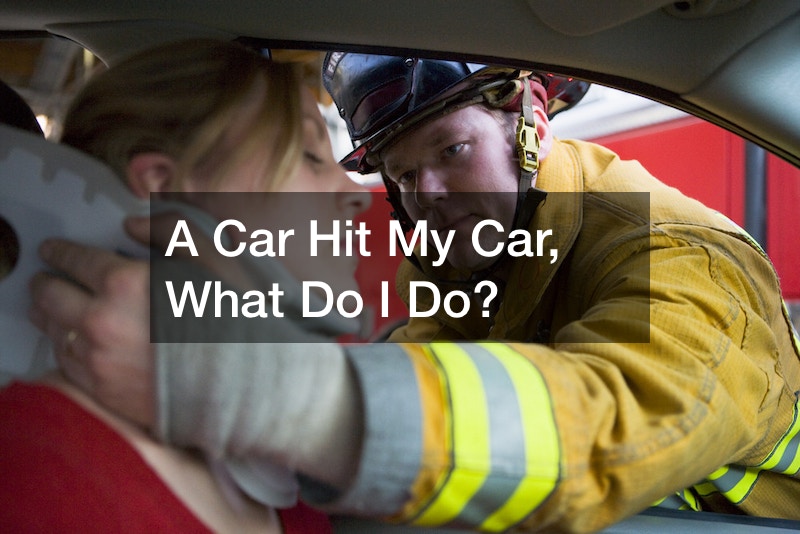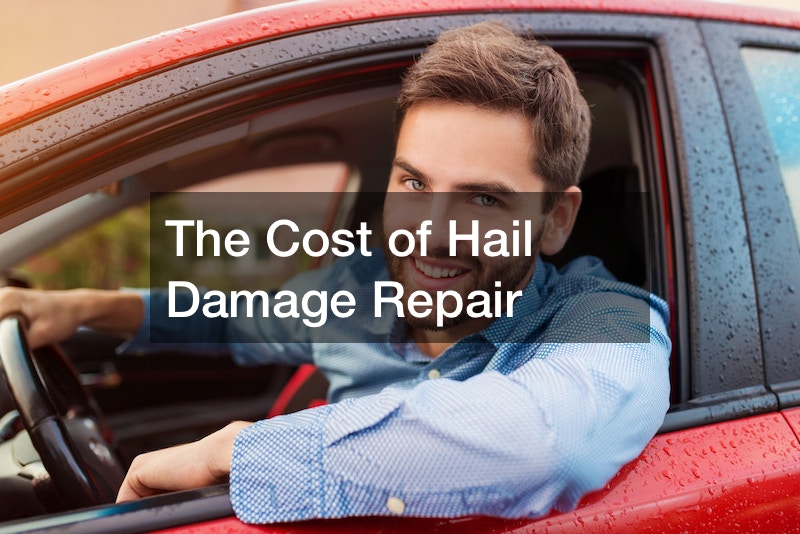
Car accidents are unavoidable in many cases, and there is a good chance you will be involved in one at some point in your life. If another vehicle hits yours while you are driving or parked, you will be forced to cope with stressful and, in some cases, life-altering moments after the collision. The first thing that takes place is the expression of concern, such as, ‘A car hit my car, what do I do?’
After being hit by another vehicle, you will need to deal with several consequences, including insurance, automotive body repair, and any injuries you may have sustained. The following article details what steps to take if another car hits yours. It will also help you prepare for the worst-case scenario, in which you get fatal injuries and need medical attention.
Move the Car and Secure the Injured

I was driving, and a car hit my car, what do I do?” As a rule, you should not move the cars after an accident so that documentation of the incident can be as accurate as possible. If another car hits yours while you are driving, and the accident is minor, it is safe to pull over to the side of the road promptly and cautiously.
Stop the engine from running and put on your hazard lights. Assess the situation to ensure that there are no injuries. If anyone has any injuries, do not rush to move them until you provide them with the appropriate first aid. Even if the accident seems small, don’t leave a child, pet, disabled adult, or elderly person in a locked, hot vehicle.
If any of the kids in the car with you are in booster seats during the accident, keep them there. For their safety, let first responders remove children from their vehicle seats before you try to inspect them for visible wounds. The other children can stay in the car, but only if it is safe to protect them from getting hurt. Carry out the same actions for any elderly passengers unable to walk or anyone else who can’t move independently, regardless of whether they are anxious or restless.
Warn oncoming vehicles of the accident by placing emergency reflector triangles, flares, or cones, a couple of feet away from the accident scene. Dial 911 immediately and advise the operator of any injuries sustained.
Gather Information
Share details of the incident and personal information with the others involved. All vehicle drivers and passengers should trade their names, addresses, and phone numbers. Other pieces of information that you will need to gather include license and plate numbers. All vehicle drivers involved should freely give out their insurance company details. You should gather information about the vehicle’s year of manufacture, model, and make.
I was parked, and a car hit my car, what do I do? Parking your car only to return to find a dent can be frustrating. Don’t go into a panic because worry and anxiety won’t help solve the situation. If you are lucky, the driver that hit your car might be sensible enough to leave a note.
If the driver leaves a note behind, contact him immediately. Ask them composedly what caused the accident, and take down all the necessary details such as insurance company, names, vehicle registration number, etc. Negotiating can be beneficial if the person that hits your vehicle probably waits for you to come back. If not, then you will have to involve the police.
Record the Damage

“I need to provide proof after a car hit my car, what do I do?” Document the crash by photographing the damaged automobiles. Take pictures of all the dents, scrapes, shattered glass, and activated airbags. Remember to take pictures of the license plates of all of the vehicles involved in the accident. Take pictures of the scene from various angles by moving back a little distance from it. In addition to revealing the positions of both vehicles, the photos should also indicate other potential contributing factors.
Investigators can learn a lot from the following factors, including where the accident occurred in relation to things like traffic lights, road signs, and other clues. Capture a structure, a stump, a tree, a fire hydrant, or a light post. Any of these could have had a role in the collision. Include any skid marks, rubble, or shattered glass you see at the accident scene in your photographs, as this information may be useful when analyzing the collision.
Take a picture from the driver’s point of view relative to their position at the time of the accident if you can do so. This will provide additional information regarding the impact of other environmental factors, such as the sun or heavy downpours affecting visibility. It’s also important to document the weather conditions at the time of the accident.
These photographs are extremely useful to your case for several reasons, one of which is that they shed light on the events that took place and identify the parties responsible. In some cases, images taken immediately after an accident might clearly show who was at fault. Having photographic evidence of your injuries increases your chances of winning your case and receiving fair compensation.
You can also record a video of the damage for improved documentation and verification. Even though collecting as many images as possible is of the utmost importance, you should also consider hiring or calling an auto accident attorney to assist you with anything else you may require.
Report the Accident
In reporting the incident, a car hit my car, what do I do? Report the accident to your insurance company and the police immediately. Some insurance companies recommend getting in touch with them immediately after an accident. However, if there are injuries sustained in the incident, that may not always be achievable.
Nevertheless, it is in your best interest to get in touch with your insurance as soon as possible, while the specifics remain fresh in your mind. It is important to verify your coverage or inquire from your insurer about the time constraints they may impose. Hiring a car accident lawyer can be a good idea if the other motorist reports that the collision was your responsibility.
You are only allowed to discuss what occurred with the attorney and no one else. Do not assert that it was your doing, and refrain from leveling any other blame. What you say could be used as evidence in a court of law.
If the damage to my vehicle is only small, such as a fender bender, and a car hit my car, what do I do? Accidents involving minor damage to vehicles are common. You won’t have to report a minor accident to your insurer if the other motorist admits fault, takes responsibility, and provides you with their contact information and the insurance company’s details. You will then contact the other driver’s insurance company to file a claim for damage to your vehicle. The insurance company will pay for repairs, replacements, and auto paint correction.
Get Your Car Out of the Scene of the Accident

After the investigations a car hit my car, what do I do? There’s a chance your car will need towing away from the accident scene. If the police deem that your vehicle is not safe to drive, they will call a tow truck or ask you to do so. If that’s not the case, you can leave the scene in your vehicle. It could be many days before you get your car back if the police believe it’s unsafe for you to drive it. Make sure that you don’t forget any valuables or vital documents.
You can have your vehicle towed to a repair shop, your residence, a storage facility, or a place designated by your insurance company. Before signing anything, get in touch with your insurance provider first, as they could be able to handle the towing arrangements on your behalf. Remember, too, that you have the authority to choose who will tow your vehicle and the destination of the tow.
A car accident attorney can assist you in deciding if you are unsure of what to do or if you are unable to speak with your insurer. Towing your vehicle to your residence is a great alternative because it will buy you some much-needed breathing room during which you can confer with your insurer, shop for the best paint protection services, and make decisions without feeling rushed.
Get Medically Examined
If there are injuries, and a car hit my car, what do I do? The best course of action is to get medical attention as soon as possible if you fear that you may have been injured. A complete medical examination is the only way to find out if you have any injuries and what treatment schedule you require if you have them. Your or the other driver’s insurance company will need information about every injury sustained during the accident.
It is important to keep track of your expenditures, even if you expect a settlement soon. If you decide against consulting the doctor either at the scene of the accident or immediately after it occurs, it will be difficult to account for the costs of your medical care later when you need the care.
Your refusal to seek medical attention immediately following the accident may also lead the insurance company to argue that your injuries are unrelated to the incident. If you become permanently disabled because of the accident, your accident lawyer must review your medical information and other associated documents for effective disability legal representation.
Why You Need a Lawyer for Your Car Accident Claim

When it comes to following up on insurance claims and legal redress after a car hit my car, what do I do? Much legwork is involved in securing an insurance settlement and pursuing a personal injury claim. Even if you’re physically, mentally prepared, and emotionally able to complete this task after a vehicle accident, you might not have the energy to do it.
However, turning matters over to a skilled accident attorney can put your mind at ease and improve your chances of a positive resolution. They are well-versed in collecting evidence to back up your claims, such as police, witness, and medical information and reports, as well as proof of employment and lost wages.
If you cannot settle your accident case, your lawyer will handle the paperwork and communication with the opposing lawyers. Your legal representative will arrange the facts and compose a demand letter for a payout to the insurer. You will have less stress to deal with if you let an experienced professional handle the day-to-day work associated with your case. This will allow you to concentrate on getting better from your injuries.
What If Repair Costs Are More than the Value of My Car?
If the auto collision repair cost is more than the value of the car after a car hit my car, what do I do? After an accident, auto sales of cars involved never have the same resale value. Even if you, the person that hit your car, or the insurance pays to repair all of the damages, the worth of your vehicle will still reduce because of diminished value.
After an accident, your insurance might declare that repairing your vehicle is far more expensive than its actual value. The insurance company will probably give you two options if this is the case. They might decide to write off the vehicle as a complete loss if repairing it will cost more than its blue value cost.
After the dust settles, the insurance company may sell the car back to you. If they choose to repair the vehicle, the insurance company will take care of all the costs, less the deductibles, and give you the car back. The two of you settle on a repurchase amount and get the vehicle and a salvage title.
You are now aware of the correct procedure to follow when dealing with a car hit my car, what do I do? These uncomplicated actions will maintain the accident scene as risk-free as reasonably practicable and will contribute to eliminating any needless finger-pointing or blame shifting. Immediately following an accident, you should consult an accident attorney for additional assistance.



